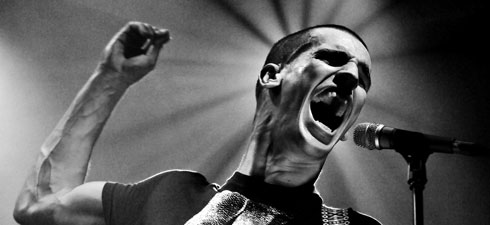Fred Bassier and Faik Sardag, the rhythmic and melodic souls of Fake Oddity, are the Turkish, Italian and Albanian-origined twosome of the up-and-coming Fake Oddity. Faik was a Turkish student who had been living in France for a year when he met guitarist Antoine in October 2002. ‘We wanted to form a group,’ explains drummer Fred, who came across the band in an advert, ‘and then we met Tom, the bassist.’ Initially going by the name of Ascolein, the band spent two years playing cover versions of Radiohead, The Pixies, The Strokes, and also music from the seventies and eighties like The Doors and David Bowie. ‘Then we decided to get serious so we changed our name,’ explains Faik. Fake Oddity’s name was inspired by two songs - the Radiohead ballad Fake Plastic Tree and David Bowie’s Space Oddity.
Their union is also the meeting of two countries – Fred’s France and Faik’s Turkey. The latter introduced the band members to his country in 2003 ; they recorded their last album Runfast in the Istanbul’s renowned Image Studios in 2007, following it up with a mini tour of the Turkish capital. Fred had this insight about the experience: ‘It impressed me that on the walls there were photos rock singers as well as traditional groups. It’s typical of Turkey; the same audience can listen to the two types of music without any problem.’
Taking advantage of the Turkish cultural season in France
After more than a year in post-production, mixing and mastering, RunFast has made its debut in France, garnering positive reviews and committing the group to a concert tour in major French cities. In the meantime though, the band’s thoughts are concentrated on one project, the Turkish cultural season in France, where 400 activities take place over 40 different cities. ‘When Lyon was candidate as European capital of culture in 2013, we decided to contribute to the organisation, because we have many connections,’ explains Fred. ‘We suggested musical exchanges between Lyon and Istanbul, but when we found out that there was to be a Turkish cultural season, we contacted CulturesFrance (an agency combining the ministries of Foreign Affairs and Culture), to put forward some ideas.’
Thus began the long search for supporters, business and non-business partners to give life to their ideas. ‘We’ll organise free concerts by Turkish groups, maybe accompanied by exhibitions by Turkish artists and painters in an environment marked in a typical style.’ Teenagers and young adults are not their only targets. ‘We’d like to involve a bigger public. There’ll be an entertainment programme for families during the day on the riverbanks of the Rhone with singers and storytellers of Turkish fables and tales,’ says Fred. Faik smiles and with eyes wide open nods positively; cultural mosaics come naturally to him. His father is Albanian and his mother is half Italian: his maternal grandmother belonged to an eastern family of Venetian ship-owners who settled in Istanbul. ‘They’re in my blood. I come from a very ‘multinational' family, very open.’
‘We don’t want to fall into any political thing,’ he mentions at the start of the meeting. ‘We want to unite cultures.’ ‘Even if France shouldn’t judge other people’s history,’ Faik continues. ‘At the end of the day, when we talk to Germans we don’t blame them for their history,’ finishes Faik. 'We're an example for many of an integration that has worked and of the potential of cultural exchanges'.
‘My boss is of Armenian origin, and so are a group of lads I played music with. There was never any discussion on past history, nor any arguments.’ Now there’s the added challenge of getting the French to appreciate Turkey, who are currently being penalised by negative media coverage, explains the singer. ‘After the Turkish cultural season in France, things will change. We don’t feel that we are an example of integration in a moral sense, we are not role models. We're an example for many of an integration that has worked and of the potential of cultural exchanges.’ ‘The fact is that we’re all together: we’d be nothing without Faik and he’d be nothing without us,’ says Fred. The Franco-Turkish relationship is ‘something which touches us deeply and which involves us. Life happened this way that we just had to invest in this project,’ concludes Fred.
Andrea Giambartolomei (translation from the Italian by Mary Maistrello)
Was this article useful? If so we are delighted!
It is freely available because we believe that the right to free and independent information is essential for democracy. But this right is not guaranteed forever, and independence comes at a cost. We need your support in order to continue publishing independent, multilingual news for all Europeans.
Discover our subscription offers and their exclusive benefits and become a member of our community now!












